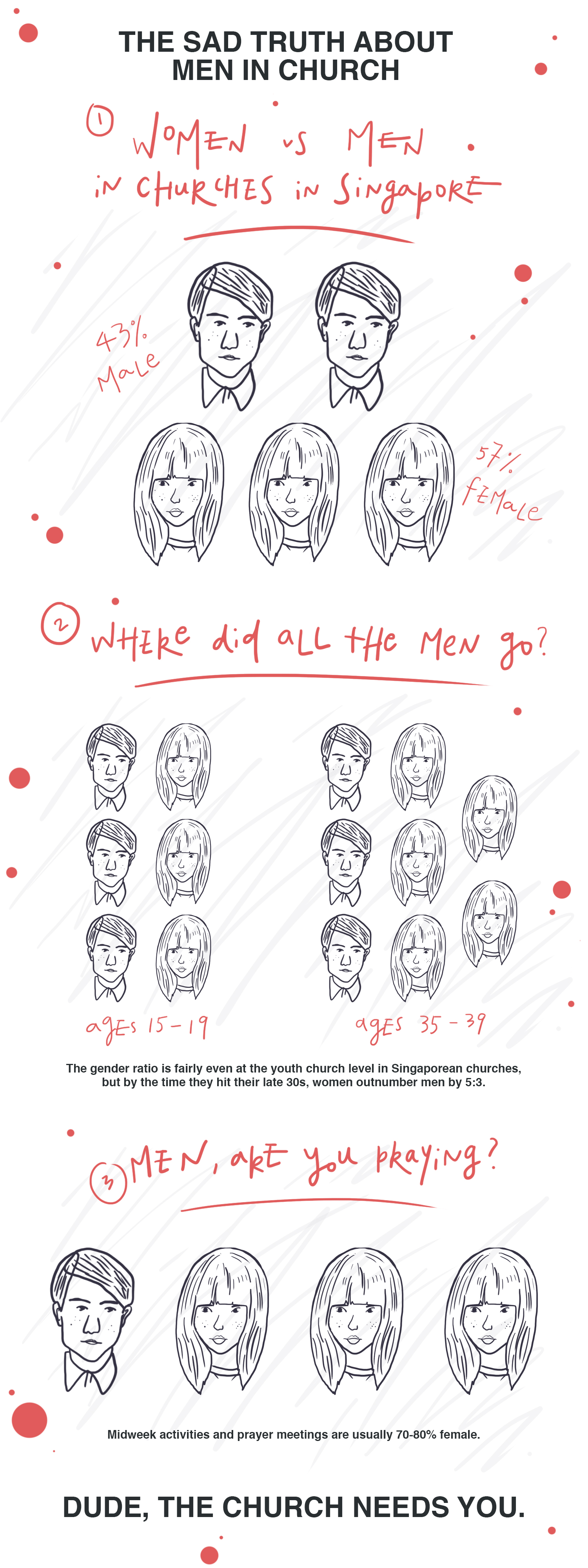“5 more, bro!” my spotter yells at me as I lay on the bench, eyes bloodshot, blood pumped with adrenaline, and clothes drenched.
“UP, UP, UP!” The final rep grinds to completion, and the bar clunks back into its hooks. Bro fist. Handshake. We swap places and the carnage resumes. “You got this, man! Nice! Come on!”
Fast forward to Sunday morning. Now I’m among multitudes of nice people, holding hands and swaying to ballads of love in a mega sing-along.
I’m not feeling it.
It’s all so structured. Someone on stage says something that sounds familiar. I hope this ends soon. I don’t think it will, though. I’m getting restless. I’m thinking about where to go for lunch.
When I walk into church, I feel the need to leave my testosterone at the door.
Mister Speaker says something about love. I’m dreaming of mountains and lakes. My mind drifts to my growing to-do list.
Monday: Finish that report, send that email, shoulders and abs. Tuesday: Groceries, visit the grandparents. Legs. Wednesday: It’s Ladies Night. I wonder if my friends have plans.
When I awake from my daydream, the church service I’m in does seem an awful lot like Ladies Night. Lights and music. Jumping and clapping. Nibbles and some booze. Just in a very tiny cup.
Some Sundays, I feel I don’t belong in church. On days like these, give me the gym, the workplace or the great outdoors. When I walk into church, I feel the need to leave my testosterone at the door.
WHERE ARE YOU GUYS?
And I know I’m not the only guy feeling it. I look at every solitary man standing arms-crossed at the back of every worship service, boredom and dread written all over his face. They are numerous, but each is alone and a dying breed.
Let’s look at some numbers, from the most recent national census:

The statistics suggest that Christian men in Singapore are rejecting their faith as they grow older. That’s in line with surveys conducted abroad, which suggest that most boys raised in church will abandon their faith in their teens and 20s; many never return.
So the average Christian man accepts the reality of Jesus Christ, but struggles to see any value in attending church or practising the faith. Such a trend is not seen in other mainline faiths; it is unique to modern Christianity.
Q: What’s the difference between church and Ladies Night? A: Men don’t want to be at church.
Most historical giants of the faith were men. Given the prevailing social dynamic that empowered men and kept women down, ordained clergy were primarily male, while congregations and church staff became largely female – submissive and nurturing.
But as feminism made headway in society at large, arguing against the oppression of women, men found their leadership role diminished.
The average Christian man accepts the reality of Jesus Christ, but struggles to see any value in attending church or practising the faith.
There’s also the atmosphere at services, the vocabulary bandied at the pulpit. It’s not… manly. The prevailing themes of Christianity – repentance, forgiveness, compassion, humility – grate against common perceptions of manhood.
Many find stereotypical masculine traits, such as risk-taking, adventure, leadership, joking and questioning, repressed in a typical church setting. Traits previously thought of as feminine, such as being nurturing and encouraging, or submission to authority, are rewarded.
Submit? Surrender? Never.
REDEFINING BIBLICAL MASCULINITY
Given the cultural variability of what is masculine or feminine, we should avoid using these gendered terms when talking about human characteristics.
Read the Bible and it is not immediately clear what biblical masculinity is. From Adam (too deferential) to Noah (mocked), David (emo) to Daniel (dreamer), Jonah (petty) to Nehemiah (menial worker), Jacob (Mummy’s boy) to Jesus (where do I even begin?).
Look at the Jesus’ disciples – servile, humble, leaning on male bosoms.
Dude.
On the flip side, what about Esther, Ruth and Deborah – could you say there’s a biblical paragon of femininity?
But here’s what they all have in common: God deliberately chose them all – King, eunuch, farmer, slave, prophet – using them redemptively and powerfully for His work. He can use anyone, regardless of genetic predispositions and environmental upbringing.
REDISCOVERING THE BRETHREN
What can the church do? Let’s start with what it shouldn’t: Don’t try to “masculinise” or “de-feminise” church culture by doing the Haka to choruses of blood and war, bro-fists and chest-bumps from a running start. The environment needs to change, and it starts with our mindsets.
How many Christian men have any sort of male support in or out of church? How many engage in vibrant, positive fellowship with their brethren once they step out of the church door?
Men need a band of brothers: Mission-focused, purpose-driven brothers who are willing to charge alongside them. Think trudging through the trenches of Normandy under the whistling rounds of machine guns. Someone falls, his comrades go back for him, dragging him from the jaws of death. Snatching him from the fire.
How many Christian men have any sort of male support in or out of church? How many engage in vibrant, positive fellowship with their brethren once they step out of the church door?
REVIVING THE MALE MODEL
Whether it is because he is in a position of leadership, or because of cultural norms on social interaction, the common churchgoing male typically finds himself alone. But we need a culture in which men intentionally journey with one another, supporting, encouraging, challenging their peers to overcome failure, hone their strengths and grow them to the best possible version of themselves.
A culture where there’s no shame, no ego, no awkwardness.
It’s not about starting a bromance. In this platoon of faith, a bro must never walk alone.
The more mature among the men must rise up as leaders – mentors to whom the young will look up to in admiration, not for talents or giftings, but for godly character (Titus 2:6-8). Mentors who will inspire those around them to say: That’s the life I want to live. That man’s life is how I know Jesus is worth my time and energy. He revealed Jesus to me.
This is discipleship. Follow me as I follow the example of Christ (1 Corinthians 11:1).
RAISING THE STAKES
Without diminishing the need to continue to help the women and children in our communities, men’s ministry must no longer remain a church’s lowest priority – if it is a priority at all.
Men must be engaged on issues of identity: child of God, man of God. They need to know what success looks like, in the workplace, in their family and in their personal life. They need handles on marriage, parenting, leadership, career and, most of all, purpose. All from a perspective that shows regard to the special God-given identity as a man.
Invite questions and ask for feedback. Keep each other engaged. Ask after each other’s needs. Walk through the valleys and get to the summit together. Challenge each other to take the Gospel further than you thought possible.
BEYOND MEN
The church needs everyone to fulfil his or her God-given mission of reaching souls, at our doorsteps, the workplace, the gym, the classroom, or in the remote wilderness of Mongolia. Our mission field is vast. Stop rebuking their strengths and forcing them into that nice Christian mould.
Founder of Sure Passage men’s ministry, Gentry Gardner, identified discouragement as a reason for men disconnecting from church. Many feel they can’t contribute in areas where they are strong, and instead turn to ministries like ushering or parking duties, which, while needful, don’t play to their full strengths.
But, says Gardner, “once you start attracting a man’s full heart, soul, mind and strength — and he sees that there are ways he can use all those in the church — then we’re going to start seeing a turnaround of the absent man”.
This goes beyond how we identify as men or women. We’re talking about the need for dreamers, warriors, adventurers and risk-takers, regardless of gender.
There’s a need for believers who are restless, sick of paying God mere lip service, and who don’t want to settle for a life more ordinary. Christians willing to live and die for a great cause larger than themselves. Those who count the cost, then charge forward anyway, without looking back.
Those unbounded by walls, programmes and routines. Those whose deeds outweigh their song. Rebels for a great cause.
It’s not just about serving God with all your heart your soul, but your mind and strength, too. Harness your gifts to the heart of God. Build homes for the desolate and lowly. Create technology to solve real problems and meet real needs. Teach those unable to afford an education.
The world can always use more just and discerning lawyers. Wise and compassionate doctors. Morally upright politicians. Such champions of social justice will bring Jesus to the world beyond church walls.
It’s a big battle to fight. Which is why we need fellow soldiers in the trenches with us. A real band of brothers, or sisters, defined by our ultimate purpose, not how the world tells us to think about gender.
So stay close to your comrades – and call them to battle. Tell them how crucial Christ is for the future of the human race and how they are so important in that redemption equation.
Just one life to live, bro. Sis. You got this. Come on.









